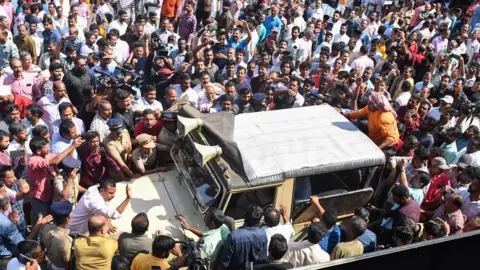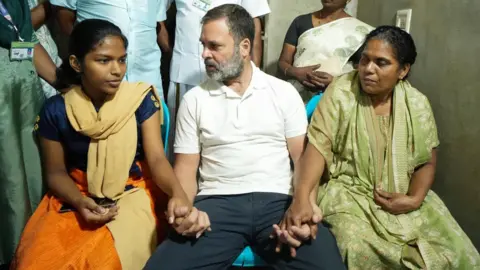
KERALA'S WAYANAD DISTRICT IS KNOWN FOR ITS DENSE FOREST COVER
KERALA: INDIA TOWN OUT ON STREETS OVER ELEPHANT ATTACKS
BY: ASHRAF PADANNAORIGINAL SITE: BBC NEWS
"I'm afraid the elephant that killed my father could come back to attack again," says 13-year-old Alna Joseph.
On 10 February, Ms Joseph was returning from morning prayers at her village church in Mananthavady town in the hilly Wayanad district of the southern Indian state of Kerala when she saw a vehicle carrying a bleeding man.
When she reached home, she found out that it was the body of her father Ajeesh Joseph, a 42-year-old farmer, who had been trampled to death by a radio-collared wild elephant - the second such death in the district in three weeks.
As soon as the local hospital confirmed his death, protests erupted in the town. They were withdrawn only after the authorities announced a 1m-rupee ($12,067, £9,525) compensation for Joseph's family and a job for his widow.
Neighbouring Karnataka state, to which the elephant belonged, also announced a compensation of 1.5m rupees.
Six days later, another wild elephant killed Pakkam Vellachalil Paul, a 50-year-old employee of a state-owned eco-tourism project, while he was on duty in Pulpally town, about 24km (15 miles) away.
Since then, Wayanad district - known for its dense forests - has witnessed massive protests as angry residents blame authorities for failing to protect them from wild animal attacks.
"We often see elephants roaming around when we go out," Ms Joseph says. "Most of them don't attack us. But how do we distinguish them from the dangerous ones?"
Last week, the funeral procession for Paul turned violent as protesters sat with his body - his last rites were performed only after the intervention of local politicians and religious leaders.
Protesters also placed the carcass of a calf killed by a tiger in the town on a forest department vehicle and booed local representatives.
Police accuse protesters of "assaulting forest department employees, damaging a vehicle and stopping policemen from carrying out their duties".
Opposition Congress party leader Rahul Gandhi, who represents the Wayanad constituency in parliament, rushed to the state on Sunday to meet the families of the animal attack victims.
The state government held an all-party meeting and promised to cover medical expenses of those affected by such attacks, while the forest department said it had issued orders to tranquillise the elephant that attacked Joseph.

Arun Chandrabose
Last week, protests against frequent animal attacks turned violent
Residents say they want strong boundary walls, solar-powered fencing, elephant-proof trenches, early warning electronic systems, radio-collaring of all wild elephants and creation of wildlife corridors - all things that have been promised by the authorities in the past.
There is also growing resentment that the state's chief minister and forest minister have not visited the area since the attacks.
Man-animal conflict is a major issue for Kerala, state Forest Minister AK Saseendran admits.
Known for its lush green landscape, the state covers only 1.2% of India's land area, but accounts for 2.3% of its forest cover.
Wayanad has 11,531sq km (1.1m hectares) under forest cover, which is 29.6% of the state's geographical area.
Residents of the district say most of the electric fencing and trenches dug to protect them from animal intrusions are in ruins.
Mr Saseendran says habitat loss and climate change and its impact on the ecosystem have contributed to rising human-animal conflicts here.
"Most of the raids are by reclusive elderly elephants who are hurt while fighting with youngsters in a herd," the minister adds.
Authorities say they are installing 250 surveillance cameras to track animal intrusions in vulnerable areas of the district.
"We need to protect the lives of both humans and animals and ensure a healthy coexistence," Mr Saseendran told the BBC.
The authorities also say a higher population density exerts more pressure on forest resources from dependent communities.
But residents don't entirely agree and blame government policies for shrinking natural habitats that are forcing animals into residential areas.

Arun Chandrabose
Wayanad MP Rahul Gandhi met Paul's family after his death sparked protests in the district
N Badusha, a 71-year-old farmer and environmental activist who lives near the district's Muthanga Wildlife Sanctuary, says the area lies at the junction of wildlife reserves of three states.
"Traditional farmers like me and the tribespeople lived here harmoniously for years," he says.
But decades of bamboo extraction from areas that the elephants relied on for sustenance have destroyed their food source, he says, adding that the government's push for monoculture plantations such as teak, sandalwood, mahogany, acacia and eucalyptus has also affected the movement of wild animals.
"Today, around 36,000 of 96,000 hectares of Wayanad forests are monoculture plantations such as eucalyptus," Mr Badusha says.
"The pristine and precious green spaces, vast swamps and wetlands are depleting," he explains, pushing wild animals, such as elephants onto farmlands and residential areas.
Residents say the district's burgeoning tourism industry, cattle grazing, invasive plants and forest fires are also destroying wildlife habitats in the region.
They blame the authorities for failing to find a solution to the resultant animal attacks.
In some of the recent cases, residents have also questioned the shoddy response by the authorities. They say that the elephant that attacked Joseph had a radio-collar. So, how come the authorities failed to track the animal and drive it back to the forest?
Mr Saseendran told reporters there had been a delay in tracking the elephant due to signal disruption from the radio-collar.
In the case of Paul's death, his family also alleges that he failed to get medical treatment at the right time.
"He was shivering in fear and pain," his 16-year-old daughter Sona says. "Had he got timely medical assistance, he would have survived."
The state government said it would inquire into the allegation.

Arun Chandrabose
Sharath, a 14-year-old tribal boy, got fractured ribs after a wild elephant attacked him last month in the same area where Paul was killed
"People have lost faith in the system," says V Mohammed Ali, who runs a tourist home in Wayanad.
It's not just wild elephants they are worried about but animals like wild boars, tigers, bison and monkeys that make off with their cattle and eat their crops.
"Two months ago, a tiger killed a man and his half-eaten body was recovered later," Mr Ali says. "People wanted to shoot the animal but were stopped by the authorities."
Forest officials have also not been able to locate the tiger that killed the cattle in Pulpally as its pugmarks were untraceable.
"My only prayer is that no child is orphaned because of irresponsible authorities again," Ms Sona says. "No other little one should ever have to cry like I did. We should be able to leave our homes without fear of an attack."

Read more India stories from the BBC:
AWFSM CATEGORIES
Activism | AI | Belief | Big Pharma | Conspiracy | Cult | Culture | Deep State | Economy | Education | Entertainment | Environment | Faith | Global | Government | Health | Hi Tech | Leadership | Politics | Prophecy | Science | Security | Social Climate | Universe | War
